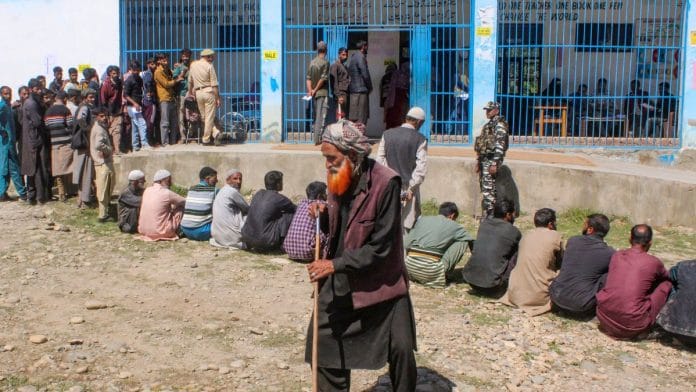Thank you dear subscribers, we are overwhelmed with your response.
Your Turn is a unique section from ThePrint featuring points of view from its subscribers. If you are a subscriber, have a point of view, please send it to us. If not, do subscribe here: https://theprint.in/subscribe/
The Indian government’s decision to conduct elections in Kashmir in October 2024 may appear, on the surface, as a step toward restoring normalcy in the region. However, without addressing the root cause of the Kashmir conflict—the unresolved political status, the aspirations of the Kashmiri people, and the deep-seated mistrust between the state and its citizens—these elections risk being little more than a superficial exercise in democracy.
The Kashmir conflict, rooted in the partition of India and Pakistan in 1947, has been a bone of contention for over seven decades. At its heart is the question of self-determination for the Kashmiri people, many of whom feel alienated from both India and Pakistan. While India has consistently portrayed elections as a means of democratic expression, Kashmiris often view them as an imposition of Indian rule rather than a legitimate process reflecting their aspirations. The political disenfranchisement felt by large segments of the population cannot be healed through electoral exercises alone.
The abrogation of Article 370 in 2019, which stripped Jammu and Kashmir of its special status and autonomy, further exacerbated tensions. It created a significant trust deficit between the Kashmiri population and the Indian government. For many, the electoral process under the current political framework is seen as illegitimate, as it no longer represents the region’s distinct identity or aspirations for autonomy.
Conducting elections in a heavily militarized zone, where civil liberties are often curtailed, does little to foster genuine democracy. Over 700,000 Indian troops remain stationed in Kashmir, making it one of the most militarized regions in the world. For many Kashmiris, this military presence is a constant reminder of repression, surveillance, and control.
When elections are held under such conditions it becomes difficult to see them as free or fair. Instead of promoting participation, this environment leads to fear, disillusionment.
Kashmiri political parties like the National Conference (NC) and the People’s Democratic Party (PDP), once pillars of local governance, have been significantly weakened post-2019. After the revocation of Article 370, their role in Kashmir’s political landscape has diminished. Many of these parties have lost their credibility amid serious allegations of corruption, nepotism and promotion of dynastic rule, and their loss of influence has left a political vacuum, exacerbating public disillusionment. Although new political parties and outfits have mushroomed to fill the political vacuum thus created, they are perceived as agents and surrogates for the policies of the Indian government.
Meanwhile, pro-freedom leaders and groups who have long championed self-determination for Kashmiris either through independence or accession to Pakistan have consistently boycotted elections, arguing that participation legitimizes Indian rule. Although showing willingness to take part in the electoral process of late, some of these parties continue to be sidelined by detaining their leaders and workers or banning their activities. As long as these core grievances remain unaddressed, elections will continue to be viewed as irrelevant by large segments of the Kashmiri populace.
At the core of the issue is the need for a comprehensive political solution that addresses Kashmir’s unique history, aspirations, and grievances. This cannot be achieved solely through elections, but rather through meaningful dialogue between the Indian government, Pakistan government, local political actors, and civil society groups, including those who advocate for self-determination including an Independent Kashmir.
A solution must also take into account the voices of all stakeholders, including Kashmiri youth who have been disillusioned by decades of conflict and failed promises. Their frustration has in the past manifested in stone-pelting protests, militancy, and growing alienation. Without engaging this disaffected population in dialogue, no electoral process can be successful in bringing lasting peace to the region.
Kashmir’s unresolved status continues to impact not only India’s internal security but also its relations with Pakistan and broader international perceptions of its commitment to human rights. The international community, including bodies like the United Nations, has repeatedly called for dialogue and a peaceful resolution to the conflict, often framing it as a question of self-determination. Conducting elections without addressing the underlying political dispute does little to improve India’s standing or bring stability to the region.
While elections are a hallmark of democracy, they cannot substitute for resolving the core political conflict in Kashmir. Without addressing the region’s aspirations for self-determination, autonomy, and dignity, any election will be perceived as a hollow exercise imposed by an external power. The futility of these elections lies in their inability to address the deeper crisis of identity, governance, and political rights that has plagued Kashmir for decades.
What is required is not just elections, but a roadmap toward reconciliation, dialogue, and, ultimately, a resolution that respects the will of the Kashmiri people. Until then, elections in the region will continue to be fraught with tension, disillusionment, and a sense of futility
These pieces are being published as they have been received – they have not been edited/fact-checked by ThePrint



@Trjesh?
Do you think they didn’t check that?? They actually published it only because it is written by a separatist
I mean the print can’t even do a simple background check….all u need is his twitter profile….
He doesn’t even lives in Kashmir….he lives in USA and post everyday asking for revolution (even violent kind)….but the print support these idiots…even without a simple editorial check….I would have accepted his view if he was living in Kashmir but he never visited Kashmir in recent past and writing like he knows everything